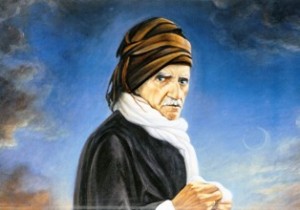 A century ago he asked Sultan Abdul Hamid to open a university in Van and to teach three languages Kurdish, Arabic, and Turkish.
A century ago he asked Sultan Abdul Hamid to open a university in Van and to teach three languages Kurdish, Arabic, and Turkish.
Said Nursi"s prescription for the Kurdish Problem :
Said Nursi was an apostle of peace, a towering hero, and a historical Islamic role model whose mission in life was to serve others, one of only a few genuine Muslim prophets produced by the Islamic civilization
Said Nursi was a charismatic figure who attracted people by the depth of his concepts and thoughtfulness of his insights.
His vision was to liberate mankind completely and to eliminate injustice against the Kurdish people.
Said Kurdi wrote, I can live without bread, but I cannot live without freedom.
He argued that freedom of thought and expression are vital for human beings to survive. As a visionary man who believed that men of this modern age want to know the reasons and goals for everything, he proposed a solution for the problems of contemporary man from his Islamic perspective.
Said Nursi provided the answer to the Kurdish question that occupies the minds of scholars of the twenty-first century.
A century ago he asked Sultan Abdul Hamid to open a university in Van and to teach three languages--Kurdish, Arabic, and Turkish.
He said that the reason he wanted to teach Kurdish was because the majority of the people in the region are Kurds, and they have the right to learn their mother language; therefore, the university should be teaching in Kurdish.
Also, Arabic is necessary because it enables Muslim people to understand their religion. Finally, the university should teach Turkish because it is the state"s official language.
The question needs to be asked, If Sultan Abdul Hamid had accepted his offer for a university, would Turkey be facing this kind of problem today?
Many Turks believe that imperialist powers want to ruin the peace and unity of the Turkish people, and therefore they are using the Kurdish card to achieve their goal. If the demand of Said Nursi had been met, would the outside powers be able to use the Kurdish card now?
Why did the Turkish government leave the door open for other nations to use this card? Why did it not take care of its citizens and treat them with justice and equality, rather than call them by the name of mountain Turks.
Said Kurd's philosophy advocated establishing moral order in a society, so that the people will differentiate wrong from right. He believed that faith could empower communal life by emphasizing the power of freedom of expression and the power of knowledge to build a stable, faithful community.
Said Nursi wanted all human beings to know that religion is a powerful asset of all mankind, and consequently, he never tried to build the Pan Turkism like his disciple Fethullah Gülen does.
His message notes the importance of stability and the integration of a social life, freedom, and peace because he did not like negative actions.
He reinforced love and tolerance in society and strongly rejected ethnic extremism and racism, but yet never denied his own Kurdishness.
He did not want to have an independent Kurdish state even though during that time some of the Kurds wanted to establish one.
Furthermore, when Sheik Said wanted Said Nursi to join him to rebel against the government, Said declined the Kurdish rebels" offer for him to join the movement to have independence. To answer those who advocated an independent Kurdish state, he responded, How can I do this? The Turkish nation has always been at the service of Islam for 1000 years. It has sacrificed many including martyrs.
Rebelling against this nation is not right. We are all Muslims; we are brothers with them; do not make brother fight against brother, because Islam rejects this. The only way to get out of this problem and idea is to enlighten the people"s mind with the Qur'an and faith and to get rid of your biggest enemy. Said"s highest goal was to unite all Muslims.
Said Nursi never gave up his cause. He remained loyal to his mission without any retreat, never wavering in his position to deny luxuries and to stay optimistic about the future
At one point Ataturk asked him to be the Minister of Religion. Said Kurdi rejected his offer because of Ataturk"s secular policy, his separation of church and state, and his ban of the caliphate, among other reasons. He thought that Ataturk tried to take Allah out of people"s life and to set up atheism, so he declined to take the position.
Said Nursi stayed away from politics and viewed isolation from politics as important even though his mission was to serve the nation.
He claimed that if you held salvation in one hand and politics in the other, he would choose salvation.
He totally withdrew from politics and devoted himself to spiritual teaching and writing. Said Nursi said, I seek refuge in Allah from the Devil and politics. He did not believe that people should use religion as a scapegoat because religion is the grammar of all society. In addition, religion should not be a scapegoat to use for one"s own personal interests. If religion is associated only with a certain group like Gülen teaches, insisting that only Turks represent Islam because Allah choose the Turks for this mission of bringing the world under Islam, Said Kurdi would reject this idea of religion being identified with only one faction or party. Said Nursi is different from other religious leaders in Turkey like Gülen.
He was not part of the Ottoman elite ruling class. He never lived a luxurious life; he never even had a bodyguard, but instead spent most of his life in exile and in prison in Turkey.
Further, he believed that change happens gradually. It must begin with individuals and spread to the community and then to the political sphere. When will this gradual change begin in Turkey? When will Turkey listen to his message and use his prescription for the Kurds that he offered over a century ago? Also, Said Nursi believed that politics must be an art of persuasion, not one of force and cruelty; rather it should build the support of its citizens by treating them as equal and with justice, realizing their communal value.
It is true that not all Turks are racists; there are some Turks who have a moral compulsion to fight long and hard for racial justice like Ismail Besikci. He was a Turk but stood for the Kurdish right to exist in Turkey; however, it is also true that injustice and deprivation have characterized the long term Turkish policy toward the Kurds. This is the wrong ideology because it is based on racism. It is time for Turkey to get rid of the mentality that one Turk is worth a world because it is arrogant and immoral to think that one race is the measure of all things and is chosen by Allah and that, as a corollary, all other races are second-class or inferior. It is time for the Turkish government to have a just society and to live and work together with faith. We are all citizens of that country and as such should have equal rights. The Kurds, Turks, Jews, Armenians, and Christians are brothers and sisters in the human family. Every one of us demands a decent life and self-realization.
If today Gülen has opened institutions around the world, bought media and sports companies, established organizations, met with global leaders, and held thousands of institutes and conferences, including the Islamic Conference, why has he not taken Said Nursi "s idea of opening universities teaching in three languages, including Kurdish, and thereby solved the problem?

